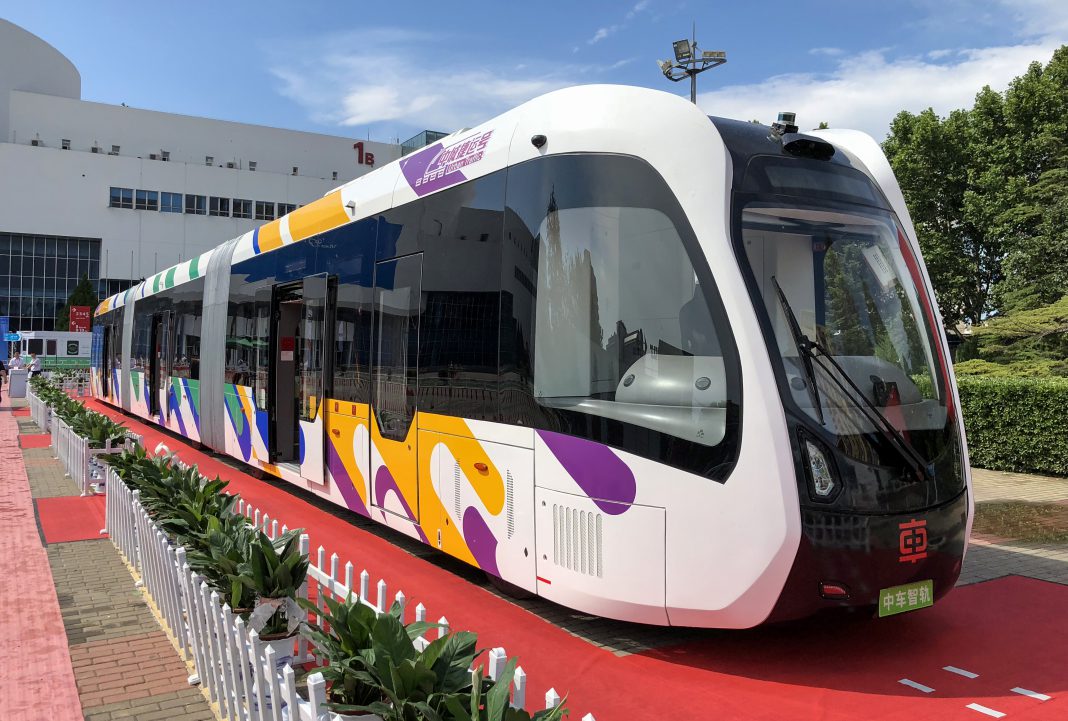Dubai’s Road Transport Authority’s (RTA) new projects under its AED16 billion ($4.36 billion) 2024-2027 Main Roads Development Plan will include expansion the Dubai Tram network with trackless systems, autonomous buses and expansion of dedicated bus and taxi lanes.
HH Sheikh Hamdan bin Mohammed bin Rashid Al Maktoum, Crown Prince of Dubai, Deputy Prime Minister, Minister of Defence, and Chairman of The Executive Council of Dubai, reviewed the transformative initiatives of RTA.
RTA is studying a plan to deploy trackless tram systems at eight locations across Dubai. This advanced, self-driving tram system operates on virtual tracks, using camera-guided painted lines on dedicated lanes. Powered by electricity, it is eco-friendly, with lower costs and faster construction compared to traditional trams. Each tram has three carriages with a capacity of 300 passengers, a top speed of 70 km/h, and an operational speed of 25 to 60 km/h. A single charge allows the tram to travel up to 100 km, a Wam news agency report said.
Sheikh Hamdan also reviewed the operational achievements of the Dubai Tram, which will mark its 10th anniversary on November 11, 2024. Since its launch, the tram has completed 950,000 journeys, served 60 million passengers, and achieved an 850 percent increase in ridership since opening. The tram also maintains a high punctuality rate of 99.9 percent.
BUS, TAXI LANES
Sheikh Hamdan was briefed on RTA’s plans to extend dedicated bus and taxi lanes in 2025 and 2026. This extension will add six routes covering 13 km, bringing the total length of dedicated lanes to 20 km. These lanes are projected to increase ridership by 10 percent, improve bus arrival rates by 42 per cent, reduce bus travel time by 41 percent, encourage public transport use, and alleviate traffic congestion. The lanes are also designed to support Dubai’s Self-Driving Transport Strategy 2030, with expected economic benefits estimated at AED2.3 billion over 10 years. These lanes will support autonomous, electric-powered buses.
He was also briefed about an autonomous bus equipped with the latest AI and self-driving technologies to ensure maximum safety. With a speed of 40 km/h, the bus is designed for first and last-mile transport, connecting main transit hubs with final destinations. It has a capacity of 10 – 20 passengers and serves as a practical solution for sustainable urban transport.
Sheikh Hamdan was briefed on the Commercial Transport (Logisty) Platform, a digital service developed in partnership with the private sector to enhance commercial transport services for business clients. The platform manages commercial vehicle fleets, providing on-demand booking and tracking, vehicle and driver verification, and a reliable registration database. It supports Dubai’s Commercial and Logistics Land Transport Strategy 2030, connecting customers with commercial transport providers.
CYCLING TRACKS
Sheikh Hamdan also reviewed the dedicated cycling tracks network, which spans 557 kilometres and supports an estimated 44 million cycling trips annually, alongside 2.3 million soft mobility trips. He also attended a presentation on the Smart Cycling Tracks Scanning Initiative, which uses a specially equipped vehicle to scan 120 kilometres of cycling tracks within four hours, compared to only 10 kilometres using visual assessment. This initiative aims to establish preventive, predictive, and proactive maintenance strategies for cycling tracks and their infrastructure, ensuring track quality, enhancing user safety, and promoting sustainability across the cycling network.
Sheikh Hamdan reviewed the ‘Green Road’ safe driving system, which alerts drivers of the 1,395 public transport buses in real time about traffic safety breaches. The system monitors and displays drivers’ behaviours, including sharp turns, speeding, sudden braking, lane changes, and unsafe acceleration. The system has improved safety by 54 percent and reduced risk indicators and traffic violations by 47 percent.
Sheikh Hamdan reviewed performance metrics from the Smart Control Centre, which opened in 2021 to monitor real-time violations by drivers of transport vehicles, enhancing inspection efficiency. The centre automates 47 of the 124 total violations and has recorded 367,000 violations since its opening. Fields such as artificial intelligence, the Internet of Things (IoT), cybersecurity, and big data management. To date, 44 employees and students have been sponsored to pursue academic studies for PhD, master’s, bachelor’s, and professional diploma qualifications in AI, big data, data management & analysis, and computing sciences.


